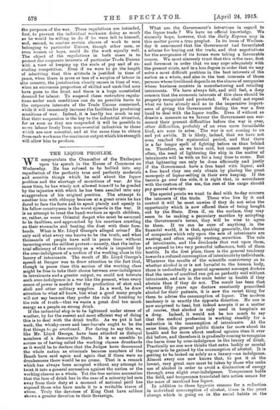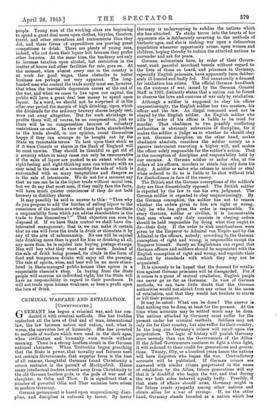THE LIQUOR PROBLEM.
WE congratulate the Chancellor of the Exchequer upon his speech in the House of Commons on Wednesday. He has refused to be bullied into any repudiation of the perfectly true and perfectly moderate and sensible things which he said about the liquor problem and the shortage of munitions of war. At the same time, he has wisely not allowed himself to be goaded by the injustice with which he bas been assailed into any exaggeration of his original position. The attempt to smother him with obloquy because at a great crisis he has dared to face the facts and to speak plainly and openly to his fellow-countrymen is the worst episode in the war. It is an attempt to treat the hand-workers as spoilt children, or, rather, as some Oriental despot who must be assumed to be faultless, and approached by his courtiers crawling on their stomachs and beating the dust with their fore- heads. What is Mr. Lloyd George's alleged crime ? He only said what every one knows to be the truth, and what thousands of people have said in peace time without incurring even the mildest protest—namely, that the indus- trial efficiency of this country as a whole is impaired by the over-indulgence of a section of the working class in the luxury of intoxicants. The result of Mr. Lloyd George's speech at Bangor was to draw attention to the fact that, though in peace time this section of the working class might be free to take their choice between over-indulgence in intoxicants and a greater output, we could not tolerate such over-indulgence in a war like the present, when every ounce of power is needed for the production of shot and shell and other military supplies. In a word, he drew attention to what all know, but what a good many people will not say because they prefer the rule of humbug to the rule of truth—that we waste a great deal too much energy as a people on strong drink.
If the industrial ship in to be lightened under stress of weather, by far the easiest and most efficient way of doing this is to deal with the drink traffic. As we put it last week, the whisky-cases and beer-barrels ought to be the first things to go overboard. For daring to say this we, like Mr. Lloyd George, have been attacked as disloyal members of a democratic State. It is as sensible to accuse us of having called the working classes drunkards as it would be to declare that the Judges have denounced the whole nation as criminals because members of the Bench have said again and again that if there were no drunkenness there would be no crime. That is a remark which has always been accepted without any attempt to twist it into a general accusation against the nation or the working classes as a whole. Yet the less serious accusation that the lure of drink has in the case of a minority led men away from their duty at a moment of national peril has exposed those who have made it to a veritable storm of abuse. Truly the devotees of King Cant have seldom shown a greater devotion to their Sovereign. What are the Government's intentions in regard to the liquor trade ? We have no official knowledge. We sincerely hope, however, that the Daily Express may in this matter prove a true prophet. In its issue of Wednes- day it announced that the Government had formulated a scheme for buying out the trade, and that negotiations for the acceptance of its terms were taking a favourable course. We most sincerely trust that this is the case, first and foremost in order that wo may cope adequately with the present crisis, and in a less degree in order that we may solve a most difficult problem in the best interests of the nation as a whole, and also in the best interests of those persons whose livelihood depends on the shares of companies whose business consists in manufacturing and retailing intoxicants. We have always felt, and still feel, a deep concern that the economic interests of this class should be properly recognized and protected. We shall not repeat what we have already said as to the imperative import- ance of giving the Government during the war a free hand to deal with the liquor traffic. Even if without so drastic a measure as we favour the Government can stir. mount their present difficulties before the war is over, other difficulties, probably of an even more formidable kind, are sure to arise. Tho war is not coming to an end yet awhile. It is likely, indeed, that we have not even reached the equinoctial period, and that there is a far longer spell of fighting before us than behind us. Therefore, as we have said, but cannot repeat too often, the need of lightening the ship in the matter of intoxicants will be with us for a long time to come. But that lightening can only be done efficiently and justly if the Government have a free hand with liquor, and a free hand they can only obtain by placing the great monopoly of liquor-selling in their own keeping. If the barrels go over the side, it is right that, in accordance with the custom of the sea, the rest of the cargo should pay general average.
The special points we want to deal with to-day concern the interests of the trade. Those who live by it and control it will be most unwise if they do not seize the opportunity which is now offered them of being bought out by the State. Even if, on the surface, they may seem to be making a pecuniary sacrifice by accepting the Government's terms, they will be wise to agree to them. If we can be sure of anything in the financial world, it is that, speaking generally, the shares of companies which rely upon the sale of intoxicants are wasting, and often rapidly wasting, securities. The sale of intoxicants, and the dividends that rest upon them, are exposed to two very powerful influences, both of them hostile. In the first place, there is the general tendency towards a reduced consumption of intoxicants by individuals. Whatever the results of the scientific controversy as to whether alcohol is or is not harmful to the human body, there is undoubtedly a general agreement amongst doctors that the mass of mankind can get on perfectly well without intoxicants, and are in the main better in health if they abstain than if they do not. The result has been that whereas fifty yenta ago doctors constantly prescribed alcohol for their patients, it is now the rarest thing for them to advise the consumption of liquor. The modern tendency is in exactly the opposite direction. No one is now surprised to hear, but indeed accepts it as a matter of course, that alcohol is only used in hospitals as a drug. Indeed, it would not be too much to say that the medical profession is working steadily for a reduction in the consumption of intoxicants. At the same time, the general public thinks far more about its health and far more about medical opinion than it ever did before, and therefore it is gradually coming to recognize the harm done by over-indulgence in the luxury of drink. Practically no one now thinks that extra bodily or mental vigour is to be gained by the consumption of alcohol. It is getting to be looked on solely as a luxury—an indulgence. Almost every one now knows that, to put it at the lowest, very great care must be taken by those who make use of alcohol in order to avoid a diminution of energy through even slight over-indulgence. Temperance holds the field, and temperance translated into action means for the mass of mankind less liquor.
In addition to these hygienic reasons for a reduction in individual consumption of alcohol, there is the great change which is going on in do social habits ot the people. Young men of the working class are beginning to spend a great deal more upon clothes, bicycles, theatres, travel, and other recreations and amusements than they did, and these forms of expenditure are proving great competitors to drink. There are plenty of young men, indeed, who cut down their liquor bill because they prefer other luxuries. At the same time, the tendency not only to increase taxation upon alcohol, but restriction in the matter of hours and other facilities for sale, goes on. At the moment, when almost every one in the country is at work for good wages, these obstacles to better business are perhaps not very apparent. The long- headed men who control the trade surely must see, however, that when the inevitable depression comes at the end of the war, and when we cease to live upon our capital, the public will have a great deal less money to spend upon liquor. In a word, we should not be surprised if in the after-war period the margin of high drinking, upon which the dividends for the ordinary brewery shares largely rest, were cut away altogether. But for such shrinkage in profits there will, of course, be no compensation, just as there will be no compensation because of voluntary restrictions on sales. In view of these facts, shareholders in the trade should, in our opinion, count themselves happy if they can arrange to be bought out by the State on reasonable terms. To look upon their stock as if it were Console or shares in the Bank of England will be most unwise. They should be thankful to get rid of a security which in many cases can only be remunerative if the sales of liquor are pushed to an extent which no right-feeling and right-thinking man can tolerate with an easy mind in the case of a commodity the sale of which is surrounded with so many temptations and dangers as is the sale of intoxicants. We do not for a moment say that no one can be in the liquor trade without moral loss, but we do say that most men, if they really face the facts, will have much quieter consciences if they do not hold brewery or distillery shares.
It may possibly be said in answer to this : "Then why do you propose to add the burden of selling liquor to the conscience of the nation as a whole, and put upon the State a responsibility from which you advise shareholders in the trade to free themselves ?" That objection can soon be disposed of. If we have State control we shall have dis- interested management; that is, we can make it certain that no one will force the trade in drink or stimulate it by any of the arts of salesmanship. No one will be cajoled into drinking more than is good for him or drinking at all, any more than he is cajoled into buying postage-stamps. Men will buy what they want and no more. Instead of the sale of drink being pressed, its rivals in the form of food and temperance drinks will enjoy all the pressing. The sale of spirits, wine, and beer will be no more stimu- lated in State-managed public-houses than opium in a respectable chemist's shop. In buying from the State people will exercise an individual right, but the State will have no responsibility in regard to their purchases. It will not trade upon human weakness, or base a profit upon the lure of drink.















































 Previous page
Previous page